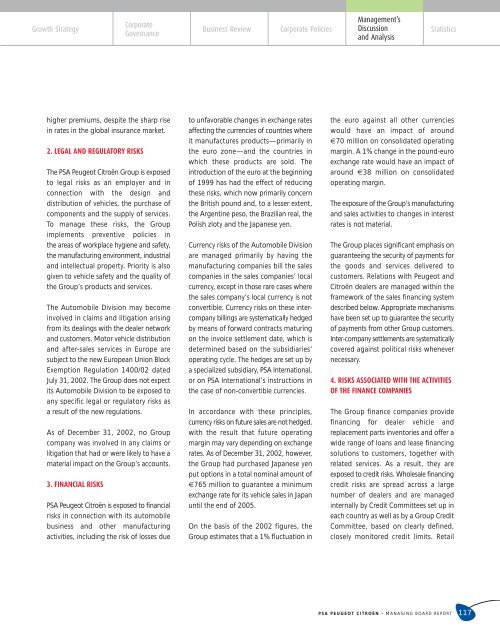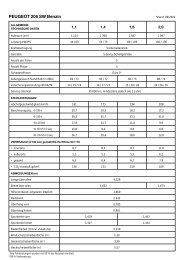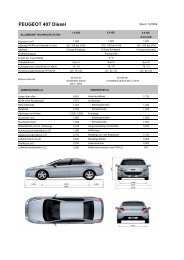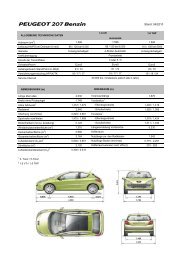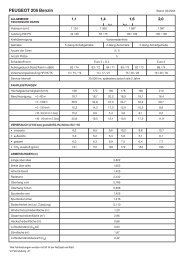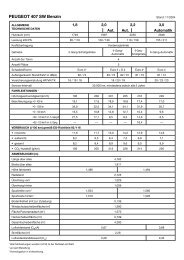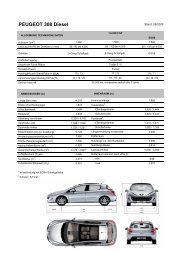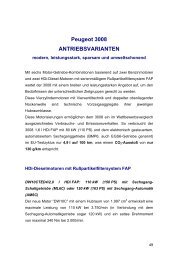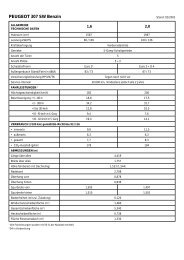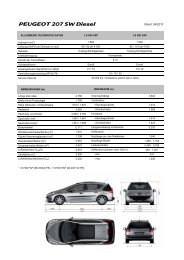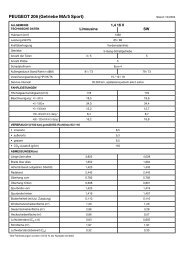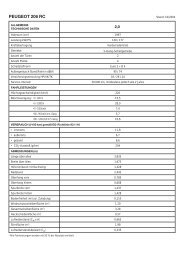PSA COUV page . page RA GB - PEUGEOT Presse
PSA COUV page . page RA GB - PEUGEOT Presse
PSA COUV page . page RA GB - PEUGEOT Presse
Create successful ePaper yourself
Turn your PDF publications into a flip-book with our unique Google optimized e-Paper software.
Growth Strategy<br />
Corporate<br />
Governance<br />
Business Review<br />
Corporate Policies<br />
Management’s<br />
Discussion<br />
and Analysis<br />
Statistics<br />
higher premiums, despite the sharp rise<br />
in rates in the global insurance market.<br />
2. LEGAL AND REGULATORY RISKS<br />
The <strong>PSA</strong> Peugeot Citroën Group is exposed<br />
to legal risks as an employer and in<br />
connection with the design and<br />
distribution of vehicles, the purchase of<br />
components and the supply of services.<br />
To manage these risks, the Group<br />
implements preventive policies in<br />
the areas of workplace hygiene and safety,<br />
the manufacturing environment, industrial<br />
and intellectual property. Priority is also<br />
given to vehicle safety and the quality of<br />
the Group’s products and services.<br />
The Automobile Division may become<br />
involved in claims and litigation arising<br />
from its dealings with the dealer network<br />
and customers. Motor vehicle distribution<br />
and after-sales services in Europe are<br />
subject to the new European Union Block<br />
Exemption Regulation 1400/02 dated<br />
July 31, 2002. The Group does not expect<br />
its Automobile Division to be exposed to<br />
any specific legal or regulatory risks as<br />
a result of the new regulations.<br />
As of December 31, 2002, no Group<br />
company was involved in any claims or<br />
litigation that had or were likely to have a<br />
material impact on the Group’s accounts.<br />
3. FINANCIAL RISKS<br />
<strong>PSA</strong> Peugeot Citroën is exposed to financial<br />
risks in connection with its automobile<br />
business and other manufacturing<br />
activities, including the risk of losses due<br />
to unfavorable changes in exchange rates<br />
affecting the currencies of countries where<br />
it manufactures products—primarily in<br />
the euro zone—and the countries in<br />
which these products are sold. The<br />
introduction of the euro at the beginning<br />
of 1999 has had the effect of reducing<br />
these risks, which now primarily concern<br />
the British pound and, to a lesser extent,<br />
the Argentine peso, the Brazilian real, the<br />
Polish zloty and the Japanese yen.<br />
Currency risks of the Automobile Division<br />
are managed primarily by having the<br />
manufacturing companies bill the sales<br />
companies in the sales companies’ local<br />
currency, except in those rare cases where<br />
the sales company’s local currency is not<br />
convertible. Currency risks on these intercompany<br />
billings are systematically hedged<br />
by means of forward contracts maturing<br />
on the invoice settlement date, which is<br />
determined based on the subsidiaries’<br />
operating cycle. The hedges are set up by<br />
a specialized subsidiary, <strong>PSA</strong> International,<br />
or on <strong>PSA</strong> International’s instructions in<br />
the case of non-convertible currencies.<br />
In accordance with these principles,<br />
currency risks on future sales are not hedged,<br />
with the result that future operating<br />
margin may vary depending on exchange<br />
rates. As of December 31, 2002, however,<br />
the Group had purchased Japanese yen<br />
put options in a total nominal amount of<br />
€765 million to guarantee a minimum<br />
exchange rate for its vehicle sales in Japan<br />
until the end of 2005.<br />
On the basis of the 2002 figures, the<br />
Group estimates that a 1% fluctuation in<br />
the euro against all other currencies<br />
would have an impact of around<br />
€70 million on consolidated operating<br />
margin. A 1% change in the pound-euro<br />
exchange rate would have an impact of<br />
around €38 million on consolidated<br />
operating margin.<br />
The exposure of the Group’s manufacturing<br />
and sales activities to changes in interest<br />
rates is not material.<br />
The Group places significant emphasis on<br />
guaranteeing the security of payments for<br />
the goods and services delivered to<br />
customers. Relations with Peugeot and<br />
Citroën dealers are managed within the<br />
framework of the sales financing system<br />
described below. Appropriate mechanisms<br />
have been set up to guarantee the security<br />
of payments from other Group customers.<br />
Inter-company settlements are systematically<br />
covered against political risks whenever<br />
necessary.<br />
4. RISKS ASSOCIATED WITH THE ACTIVITIES<br />
OF THE FINANCE COMPANIES<br />
The Group finance companies provide<br />
financing for dealer vehicle and<br />
replacement parts inventories and offer a<br />
wide range of loans and lease financing<br />
solutions to customers, together with<br />
related services. As a result, they are<br />
exposed to credit risks. Wholesale financing<br />
credit risks are spread across a large<br />
number of dealers and are managed<br />
internally by Credit Committees set up in<br />
each country as well as by a Group Credit<br />
Committee, based on clearly defined,<br />
closely monitored credit limits. Retail<br />
<strong>PSA</strong> <strong>PEUGEOT</strong> CITROËN - MANAGING BOARD REPORT 117


